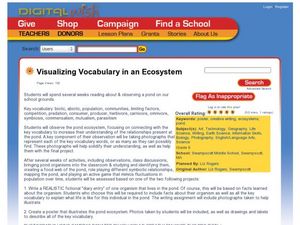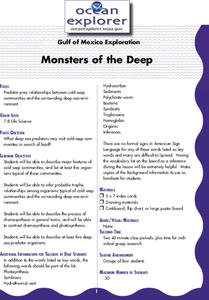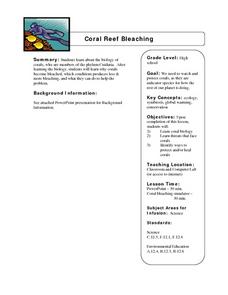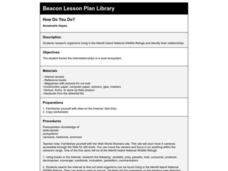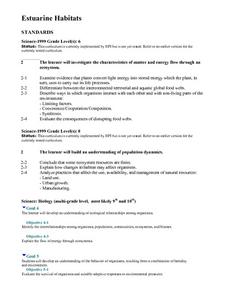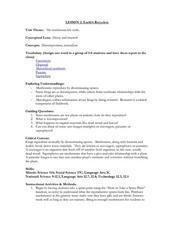Curated OER
Design a Deep- Sea Vertebrate or Invertebrate
Learners design a deep-sea animal. In this research based lesson, students research and design a vertebrate or invertebrate that lives in a methane hydrate habitat. They compile a class chart of the adaptations animals have in this...
Creative Educator
Design a Rainforest Postcard
Send your class on an expedition through the rainforest! Along the way, they will write informational postcards to demonstrate what they've learned. Each team will be responsible for one of five rainforest regions. When they return from...
Curated OER
Visualizing Vocabulary in an Ecosystem
Sixth graders observe the pond ecosystem. In this ecosystem lesson plan, 6th graders observe the organisms at the pond and create a poster that illustrates the pond.
Curated OER
Nitrogen Fixation, OR What a Gas!
Students illustrate the adaptation and co-evolution of organisms. They examine set up an experiment to determine the effect of adding the Rhizobium bacteria to a group of legume seeds.
Curated OER
Two Way Causality in Ecosystems
Students complete various activities in order to explain that ecosystems are complex and that animal behavior (mainly that of a predator) is not necessarily intentional or bad.
Curated OER
Monsters of the Deep
Students describe major features of cold seep communities, and list at least five organisms typical of these communities. They infer probable trophic relationships among organisms typical of cold-seep communities.
Curated OER
Mushroom Prints
Students create a mushroom spore design on paper while studying the facts on fungi.
Curated OER
A Reef of Your Own
Young scholars research and study the life and reproductive strategies of reef building corals. They examine how coral reefs can produce high levels of biological material when they are surviving in areas of low nutrition.
Curated OER
Coral Reef Lesson Plan Caution: Do Not Bleach!
Learners explain five ways that coral reefs benefit humans and identify three threats to the reefs. They investigate the phenomenon of "coral bleaching" while examining ways to reduce threats to coral reefs.
Curated OER
Advanced Sentence Completion 14
In this sentence completion worksheet, students choose the best word(s) to complete each sentence from five possible choices.
Curated OER
What Role Do Forest Play in Continuing or Renewing Our Planet's Resources?
Learners explore the interaction between the forest and wildlife. In this forestry lesson, students collect data about forest ecosystems, species of trees, photosynthesis, and interaction of organisms. They prepare a lab activity to...
Curated OER
Living With the Heat: The Ring of Fire
Students investigate the planet Earth's infamous ring of fire and the life that thrives from it. In this ocean environment instructional activity, students investigate hydrothermal vents and how organisms thrive off their heat....
Curated OER
Choose Your Defense: Spines, Vomit and Camouflage
Young scholars investigate defensive mechanisms of insects and organisms. In this biology lesson, students draw imaginary caterpillars as well as imaginary parasites that will harm the caterpillar. Young scholars utilize the Internet...
Curated OER
Coral Reefs
Students examine the animals that live in a coral reef and how they adapt to their environment. In this coral lesson plan students write a short book on how animals inhabit the coral reefs.
Curated OER
Bugs in the Woods
Second graders identify insects and plants in the forest ecosystem in a structured field trip with stations and activity booklets. In this bugs lesson, 2nd graders explore the ecosystem of the forest, complete the booklet and play the...
Curated OER
A'ama and Pipipi Adaptations
Students explore ocean creatures. In this crustacean lesson, students determine how Black Nerite snails and Sally Light-foot crabs have adapted to their ocean habitats. Students complete diagrams and hypothesize about the necessity...
Curated OER
Mealtime for Corals
Students explore how coral polyps feed. In this science lesson, students participate in an interactive game to demonstrate how polyps within a coral colony feed. Students become coral polyps and demonstrate how they feed in this lesson.
Curated OER
A Coastal Arctic Food Web
Students create a food web of the arctic ecosystem. In this biology lesson, students explain how global warming affects this ecosystem. They explain how losing a species affects the entire community.
Curated OER
Coral Reef Bleaching
Young scholars explore the structural biology of corals. Working individually, students identify how corals become bleached and which conditions produce more and less coral bleaching. Young scholars explore how this effects the...
Curated OER
Barrier Reef Lesson Plan
Learners study the habitat and ecosystems associated with the Great Barrier Reef.
Curated OER
How Do You Do?
Seventh graders research organisms in the Merritt Island National Wildlife Refuge. They create a picture book demonstrating their understanding of relationships.
Curated OER
C.S.I. on the Deep Reef
Students study chemotropic sybioses and chemotropic nutrition. In groups, they complete a Chemotrophic Species Investigations (CSI) Worksheet.
Curated OER
Estuarine Habitats
Sixth graders study the important habitats, flora, fauna, and physical factors of coastal habitats. They compare the aquatic habitats to terrestrial habitats by researching and completing tables with the information.
Curated OER
Earth's Recyclers
Learners work together in groups to report on different topics related to decomposition. They answer questions and share their answers with the class. They discuss any topic that is unclear.
Other popular searches
- Symbiosis & Mutualism
- Symbiosis and Mutualism
- Ecology Symbiosis
- Biology Symbiosis
- Science Symbiosis
- Biology Symbiosis
- Symbiosis Mutualism
- Symbiosis & Mutual Ism
- Symbiosis Lesson
- Symbiosis Parasitism
- Symbiosis, Mutualism
- Symbiosis Mutual Ism




